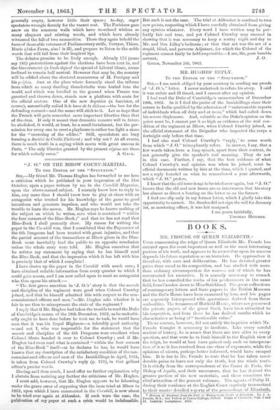"J. 0." ON THE MHOW COURT-MARTIAL.
To THE EDITOR OF THE " SPECTATOR."
SIR,—My friend Mr. Thomas Hughes has forwarded to me here a criticism which he published in your impression of the 31st October, upon a paper written by me in the Cornhill Magazine, upon the above-named subject. I scarcely know how to reply to him, any more than I should know how to play at chess with an antagonist who trusted for his knowledge of the game to good intentions and generous impulses, and who would not take the trouble to learn the moves. Mr. Hughes says he knows nothing of the subject on which he writes, save what is contained " within the four corners of the Blue-Book ;" and that he has not read that Blue-Book I shall presently show. My reason for writing the paper in the Cornhill was, that I considered that the Paymaster of the 6th Dragoons had been treated with great injustice, and that the partial account of the transactions at Mhow given in the Blue- Book must inevitably lead the public to an opposite conclusion unless the whole story were told. Mr. Hughes conceives that he refutes my statement by saying that he has himself read the Blue-Book, and that the impression which it has left with him is precisely that of which I complain !
I have drawn up the paper in the Cornhill with much care; I have obtained reliable information from every quarter to which I could gain access, and I am now called upon to meet an antagonist who thus opens his attack:—
"The first grave assertion in 'J. O.'s' story is that the morale and discipline of the regiment were good when Colonel Crawley joined, and that he himself admitted this with respect to the non- commissioned officers and men "—Mr. Hughes asks whether it is fair in me thus to misrepresent the state of the regiment ?
I reply that if Mr. Hughes had taken the trouble to read the Duke of Cambridge's memo. of the 18th December, 1862, as he undoubt- edly ought to have done before he took me to task, he would have seen that it was his Royal Highness—a tolerably good authority —and not I, who was responsible for the statement that the morale and discipline of the 6th Dragoons were excellent when Colonel Shute handed it over to Colonel Crawley ; and if Mr. Hughes had even read what is contained " within the four corners of the Blue-Book" itself—as he declares he has, he would have known that my description of the satisfactory condition of the non• commissioned officers and men of the Inniskillings in April, 1861, is taken from Colonel Crawley's reply (p. 170), in that gallant officer's precise words.
Having said thus much, I need offer no further explanation why I abstain from noticing any further the criticisms of Mr. Hughes.
I must add, however, that Mr. Hughes appears to be labouring under the grave error of supposing that the issue tried at M how in 1862, upon which I have commented in the Cornhill, is now about to be tried over again at Aldershot. If such were the case, the publication of my paper at such a crisis would be indefensible.
But such is not the case. The trial at Aldershot is confined to two new points, respecting which I have carefully abstained from giving any opinion whatever. Every word I have written may be per- fectly fair and true, and yet Colonel Crawley may succeed in showing that it was necessary to keep a sentry night and day in Mr. and Mrs. Lilley's bedroom ; or that that act was the act of a stupid, blind, and perverse Adjutant, for which the Colonel of the regiment cannot fairly be held responsible.—I am, Sir, your humble






























 Previous page
Previous page